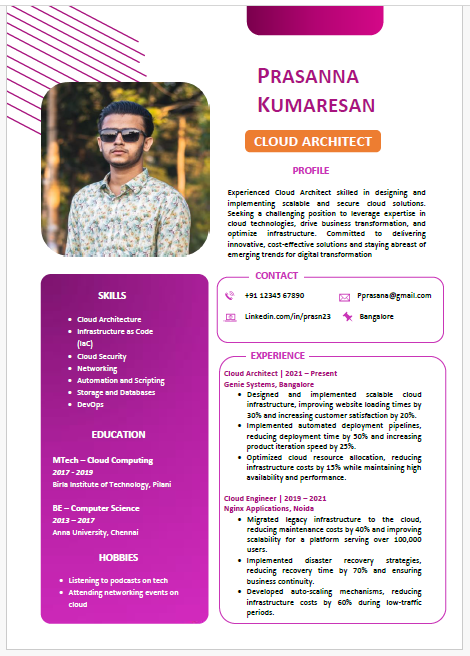Cloud Architect
MTech – Cloud Computing

About this template
This is a well-designed resume which can make a significant difference in capturing the attention of hiring managers and landing your dream job.
This resume is made by MS Word, featuring a clean and modern layout designed to highlight your skills and achievements. Tailored to your industry, it ensures you stand out to recruiters and make a lasting impression.
Some important and useful technical skills for well experienced cloud architect
A well-experienced cloud architect requires a robust set of technical skills to design and implement scalable, secure, and efficient cloud solutions. Here are ten important and useful technical skills for a cloud architect:
1. Cloud Platform Expertise:
Proficiency in major cloud platforms such as Amazon Web Services (AWS), Microsoft Azure, and Google Cloud Platform (GCP) is essential. Cloud architects must understand the services, tools, and best practices unique to each platform to design tailored solutions for different business needs.
2. Infrastructure as Code (IaC):
Knowledge of IaC tools like Terraform, AWS CloudFormation, and Azure Resource Manager is crucial. These tools allow cloud architects to define infrastructure configurations in code, enabling automated, repeatable deployments and easier management of cloud resources.
3. Networking:
A deep understanding of cloud networking concepts, including Virtual Private Cloud (VPC), subnets, load balancers, and VPNs, is vital. Cloud architects must design secure, reliable, and high-performance network architectures that connect cloud resources and on-premises systems.
4. Security and Compliance:
Expertise in cloud security principles, such as identity and access management (IAM), encryption, and security best practices, is critical. Cloud architects ensure that cloud solutions are compliant with industry standards and regulations, protecting data and systems from threats.
5. DevOps and CI/CD:
Familiarity with DevOps practices and Continuous Integration/Continuous Deployment (CI/CD) pipelines is important. Cloud architects leverage tools like Jenkins, GitLab, and Azure DevOps to automate the deployment and monitoring of applications, ensuring quick and reliable updates.
6. Containerization and Orchestration:
Proficiency in container technologies like Docker and orchestration tools like Kubernetes is essential for designing scalable and portable cloud applications. Cloud architects use these technologies to manage containerized applications efficiently across cloud environments.
7. Data Management and Storage:
Knowledge of cloud storage options, databases, and data migration strategies is crucial. Cloud architects must choose appropriate storage solutions (like block, object, and file storage) and design data architectures that optimize performance and cost.
8. Cost Management and Optimization:
Skills in cloud cost management and optimization help cloud architects design cost-effective solutions. This includes understanding pricing models, monitoring resource usage, and implementing strategies to reduce costs without compromising performance.
9. Serverless Architecture:
Experience with serverless computing services, such as AWS Lambda or Azure Functions, is valuable. Cloud architects use serverless technologies to build scalable applications without managing underlying infrastructure, improving agility and reducing operational overhead.
10. Disaster Recovery and High Availability:
Expertise in designing disaster recovery (DR) and high availability (HA) solutions ensures business continuity. Cloud architects plan for data backups, failover systems, and recovery processes to minimize downtime and data loss during outages or failures.
Conclusion :
These technical skills enable experienced cloud architects to design robust, scalable, and secure cloud solutions. Mastery in these areas allows them to lead cloud transformation projects, optimize cloud resources, and support their organizations in achieving business objectives through cloud technologies.